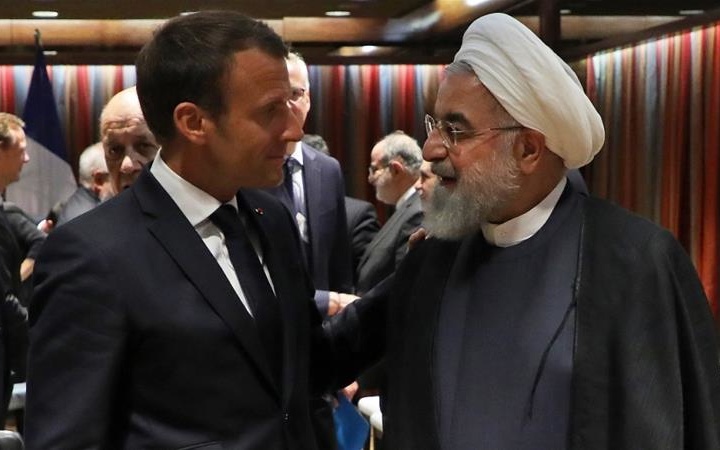French President Emmanuel Macron (L) with Iranian counterpart Hassan Rouhani on sidelines of UN General Assembly, September 24, 2019 (Ludovic Marin/AFP)
In a further distancing of Europe from Iran, the European Union has warned Tehran that it may declare the Islamic Republic’s failure to comply with the July 2015 nuclear deal.
Sources told The Guardian that the warning was agreed between the UK, France, and Germany, the three EU signatories of the agreement which also included the US, Russia, and China. The message was given to Iran at a meeting on Wednesday.
On Thursday, Iran’s Supreme Leader, appearing to reject a mediation effort by French President Emmanuel Macron, said that the Europeans had not fulfilled their commitments: “This is the strongest reason why we should not trust them in any field.”
Iran Daily, Sept 27: Supreme Leader Rejects Macron Mediation — “Europe Can No Longer Be Trusted”
Hours later, President Hassan Rouhani, in a news conference before leaving the UN General Assembly in New York, accused Europe of “inaction” and “lack of will” to stand by its promises.
The dispute arises from the failure to establish a European economic link, buffering and even bypassing US sanctions, to prop up Iran’s troubled economy.
In February, Iran rejected a European Union mechanism, known as INSTEX, because of “humiliating conditions” such as the EU’s concern over Iran’s missile program, activities in the Middle East, and alleged involvement in bomb and assassination plots in Europe.
With negotiations failing to break the deadlock, Iran began suspending its commitments under the nuclear deal in late June. This included breaking the agreement’s limit on stocks of 3.67% uranium, raising enrichment to 4.5%, and resuming the installation of advanced uranium centrifuges.
See Iran Daily, September 7: Tehran Breaks Nuclear Deal With Advanced Uranium Centrifuges
The Trump Administration withdrew from the agreement in May 2018 and imposed comprehensive sanctions in November, tightening them this spring and summer.
A Formal Route to Renewed Sanctions
The EU told Iran on Wednesday that it will put the issue of Iranian non-compliance into the nuclear agreement’s formal dispute mechanism if Tehran continues to suspend commitments.
If the dispute mechanism is triggered, both sides have 30 days to prove significant non-compliance. Failure of that process could lead to a “snapback” imposition of sanctions, lifted by the EU in January 2016 with implementation of the deal.
French President Macron had attempted this week at the UN General Assembly to renew his mediation between President Rouhani and Donald Trump. But the effort, including a $15 billion French line of credit, has founded on Paris’s need to get the Trump Administration’s acceptance; otherwise, French financial institutions face American punishment.
Rouhani told reporters in New York on Thursday that Washington should “cease this policy of maximum pressure” and pursue “dialogue, logic, and reason”.
He reflected the Supreme Leader’s shift to acceptance of discussions with the Trump Administration if US sanctions are lifted: “If we reach a time when these preconditions are taken off the table, of course the possibility exists to talk with America.”
Until recently, Ayatollah Khamenei had said any negotiations with the US are “poison”.
Rouhani said Trump had offered to meet him at the UN this week and then lift all sanctions, but the Iranian President claimed he declined because ““the optics of this were not the kind of optics that would be acceptable to us”.
Trump responded on Twitter:
Iran wanted me to lift the sanctions imposed on them in order to meet. I said, of course, NO!
— Donald J. Trump (@realDonaldTrump) September 27, 2019


Je všeobecne známe, že EÚ slúži vic záujmom USA ako Európe!